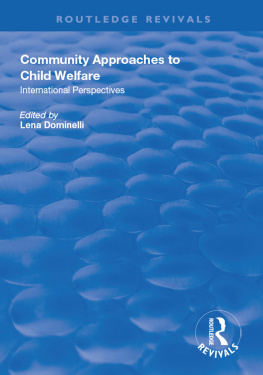First published 1999 by Ashgate Publishing
Reissued 2018 by Routledge
2 Park Square, Milton Park, Abingdon, Oxon, OX14 4RN
711 Third Avenue, New York, NY 10017, USA
Routledge is an imprint of the Taylor & Francis Group, an informa business
Copyright Margaret Bell 1999
All rights reserved. No part of this book may be reprinted or reproduced or utilised in any form or by any electronic, mechanical, or other means, now known or hereafter invented, including photocopying and recording, or in any information storage or retrieval system, without permission in writing from the publishers.
Notice:
Product or corporate names may be trademarks or registered trademarks, and are used only for identification and explanation without intent to infringe.
Publisher's Note
The publisher has gone to great lengths to ensure the quality of this reprint but points out that some imperfections in the original copies may be apparent.
Disclaimer
The publisher has made every effort to trace copyright holders and welcomes correspondence from those they have been unable to contact.
A Library of Congress record exists under LC control number: 99072841
ISBN 13: 978-1-138-31399-6 (hbk)
ISBN 13: 978-0-429-45258-1 (ebk)
Evaluative Studies in Social Work brings together research which has explored the impact of social work services in a variety of contexts and from several perspectives. The vision of social work in this series is a broad one. It encompasses services in residential, fieldwork and community settings undertaken by workers with backgrounds in health and welfare. The volumes will therefore include studies of social work with families and children, with elderly people, people with mental and other health problems and with offenders.
This approach to social work is consistent with contemporary legislation in many countries, including Britain, in which social work has a key role in the assessment of need and in the delivery of personal social services, in health care and in criminal justice. It also continues a long tradition which perceives an integral relationship between social work, social research and social policy. Those who provide social work services are acquainted with the complexities of human need and with the achievements and shortcomings of major instruments of social policy. This knowledge was exploited by, amongst others, Booth, Rowntree and the Webbs in their studies of poverty. Politicians and sociologists have also recognised that, together with the people they try to help, social workers can provide a commentary on the human meaning of public policies and the social issues that grow from private troubles.
This knowledge and experience of the recipients and practitioners of social work are not, of course, immediately accessible to the wider community. A major purpose of research is to gather, organise and interpret this information and, in the studies in this series, to evaluate the impact of social work. Here there are many legitimate interests to consider. First and foremost are direct service users and those who care for them. These are the people who should be the main beneficiaries of social work services. Also to be considered are the personnel of other services for whom liaison and collaboration with social work are essential to their own successful functioning. The needs and views of these different groups may well conflict and it is the researcher's task to identify those tensions and describe social work's response to them
The problems which confront social work are often extremely complex. They may need to be tackled in a variety of ways; for example, through practical assistance, advocacy, counselling and supervision. Outcomes may be similarly varied and studies of the effectiveness of social work must demonstrate the different kinds of impact it can have. These may entail changes in users' circumstances, behaviour or well being. On these changes, and on the kind of help they have received, users' perspectives must be of great significance. Also of central interest to those who provide or manage services is an understanding of their form and content and the relationship between the problems identified and the statutory responsibilities of social workers and the help given. Social work researchers must therefore take care to study what is actually delivered through social work and how, as well as its outcomes, aspirations and objectives. For good and ill social work has an impact on a large and increasing number of citizens. A major aim of Evaluative Studies in Social Work is to increase well-informed understanding of social work, based on knowledge about its real rather than imagined activities and outcomes.
The identification of effectiveness, in its various forms, can also not be the end of the story. The costs of the associated services must be studied, set in the context of their effectiveness, to allow the most efficient use of resources.
These demands present major challenges to researchers who have to use, adapt and develop a wide range of research methods and designs. Ingenuity and persistence are both required if evaluative research in social work is to be pursued in contexts often regarded as beyond the scope of such enquiry. Evaluative Studies in Social Work intends to make widely available not only the research findings about the impact of social work but also to demonstrate and discuss possible approaches and methods in this important and developing field of enquiry.
The first volumes in this series described studies undertaken in the Social Work Research Centre at the University of Stirling. In 1997, we decided actively to seek proposals from major centres of research for future books in this series. It had become clear from the 1996 UK Higher Education Funding Councils' assessment of research in British universities that both the quality and quantity of social work research were increasing substantially. It was also clear that a priority for many researchers - in this strategic and applied field - is, quite appropriately, to publish digests of their work in books and journals designed particularly for busy practitioners and managers. A consequence of this is that the full context, content and methodology of the research may never enter the public domain. This is a loss for researchers and those with a specialist interest in the subjects under enquiry, especially so in a relatively new and complex field of research when methodological innovation and development are important. Ashgate provides an excellent context for books which can explore subjects in depth and also allow exploration of research design, method and technique.
Juliet Cheetham and Roger Fuller
University of Stirling









